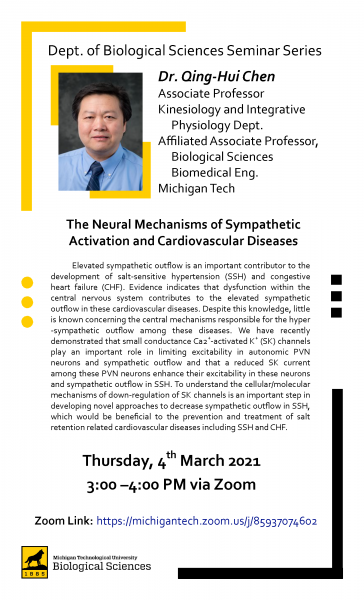
Please join Dr. Qinghui Chen on Thursday, March 4th @ 3pm via Zoom. He is an Associate Professor in our department and is an Affiliated Associate Professor in both Biological Sciences and Biomedical Engineering.

Please join Dr. Qinghui Chen on Thursday, March 4th @ 3pm via Zoom. He is an Associate Professor in our department and is an Affiliated Associate Professor in both Biological Sciences and Biomedical Engineering.
Congrats to Joshua Gonzalez on receiving the 2021 CNS Steven M. Horvath Professional Opportunity Award from #APSPhysiology. He’ll present his abstract here: http://apsebmeeting.org/eb2021/session.cfm?id=1286

Steven M. Horvath, Ph.D. was a 64-year member of the American Physiological Society, joining in 1943. Dr. Horvath obtained a B.S. in chemistry from Oberlin College, a B.A. in chemistry and physical education, as well as an M.S. in physiology from Miami University of Ohio. In 1939, Dr. Horvath commenced his Ph. D in Biological Sciences at the Harvard Fatigue Laboratory, under the tutelage of Dr. D. Bruce Dill. Dr. Horvath worked on the proposal to establish the Center for Aging Research at University of California, Santa Barbara. In 2001, Dr. Horvath became Professor Emeritus at the University of Buffalo, SUNY. Dr. Horvath took great pride in the achievements of his students, post-docs and colleagues, and during his career he authored over 550 book chapters and peer-reviewed manuscripts.
The Steven M. Horvath Professional Opportunity Award was established by his three children after his passing on March 21, 2007. This award provides funds for junior physiologists to attend and participate fully in the Experimental Biology meeting, and is granted to the top ranked underrepresented minority graduate student or postdoctoral fellow applicants of the Caroline tum Suden/Frances Hellebrandt
Professional Opportunity Awards.
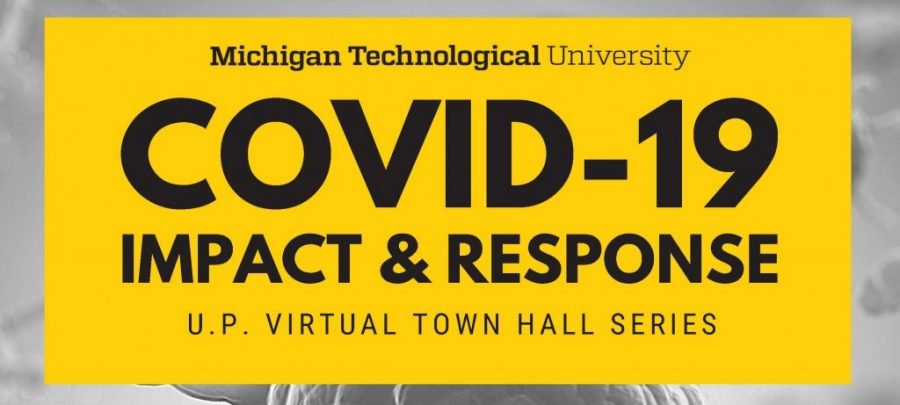
Join us for an in-depth look at all facets of the pandemic . The Town Hall will be presented monthly, January-April on the last Thursday of each month. The Town Hall this Thursday, February 25th at 7 p.m. will focus on “Mental Health and Well Being during the COVID-19 Pandemic”. https://mtu.edu/health-research/covid19townhall/…
Are you an extremely motivated student? Take a big leap forward with the Kinesiology Accelerated Master’s (BS-MS) program!
The Department of Kinesiology and Integrative Physiology will hold a brief informational session about our Kinesiology Accelerated Master’s (BS-MS) program. This accelerated degree plan allows you to combine a bachelor’s degree from Michigan Tech in exercise science, sports and fitness management, biological sciences, or biomedical engineering with a coursework-based master’s degree in kinesiology (4 + 1 = 5 years total). Together, the two degrees help students strengthen their admission applications to professional graduate programs (e.g., medical school, physical therapy school) and gain a competitive edge for careers in industry (e.g., cardiac rehabilitation, strength and conditioning). Current undergraduate students (2nd, 3rd, and 4th year) who are interested are strongly encouraged to attend one of the upcoming informational sessions
Thursday February 18
3:00 – 3:30pm
Zoom ID: 998 1757 1160
Passcode: kip2021
OR
Friday February 26th
2:30 -3:00pm
Zoom ID: 998 1757 1160
Passcode: kip2021
Stay for the KIP Department Seminar at 3pm
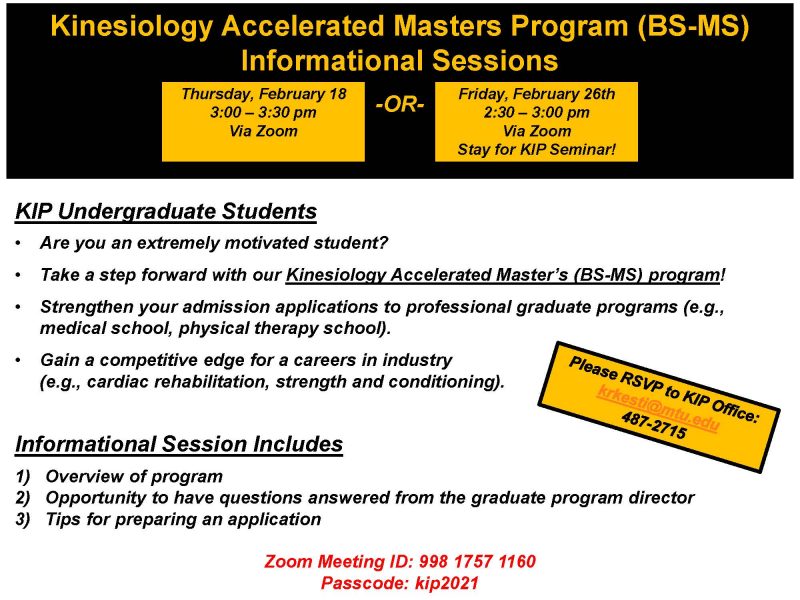
Our first spring seminar will be Friday February 12th. KIP faculty will provide a brief 3-4 min snapshot of their research/scholarly work. Please join us to learn about the breadth and depth of research from “cell to society” here in KIP.
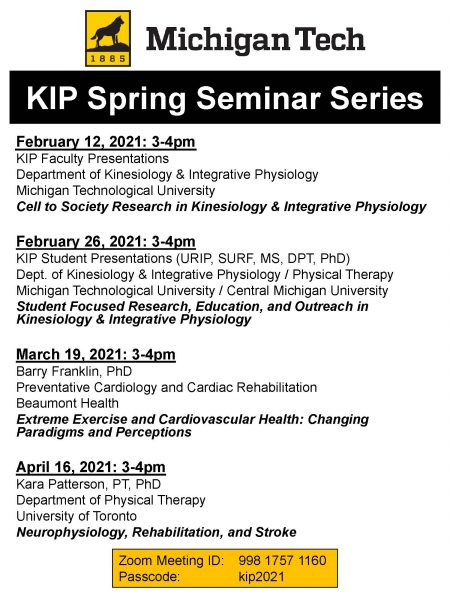

Join us for an in-depth look at all facets of the pandemic . The Town Hall will be presented monthly, January-April on the last Thursday of each month, starting 7 p.m. Thursday (Jan. 28). https://mtu.edu/health-research/covid19townhall/…
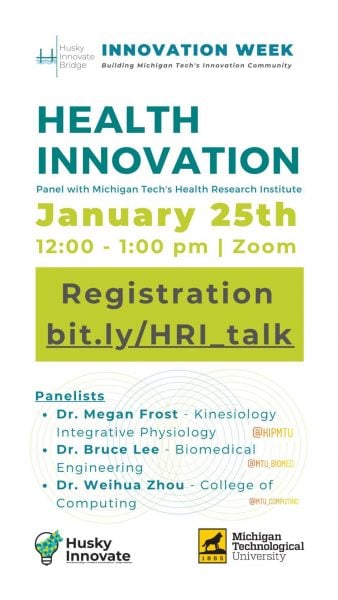
Please register to join our Department Chair, Dr. Megan Frost, and her colleagues on January 25th from 12-1pm.
Our seminar topic this month will focus on how to adapt and move research forward during the pandemic. We will also discuss how the pandemic is impacting internship experiences and what opportunities students have.
A variety of faculty and student speakers will give brief rapid-fire presentations and answer questions along the way. The seminar goal is to facilitate meaningful discussions for how to provide robust research and internship experiences for students during the pandemic.
KIP November Seminar: Friday, November 13 from 3:00 – 4:00pm
“Strategies for Conducting Research during the COVD-19 Pandemic” Please email kip@mtu.edu for Zoom link before noon on Friday.
Please join the KIP department from 3 to 4 p.m. this Friday (Oct. 30) as Dr. Kaushik Patel from the Dept. of Cellular & Integrative Physiology at the University of Nebraska Medical Center presents “Enhanced Sympathetic Outflow in Heart Failure: Improving ‘NO BRAKES’ by Exercise Training,” via zoom.
Contact kip@mtu.edu for the Zoom link.
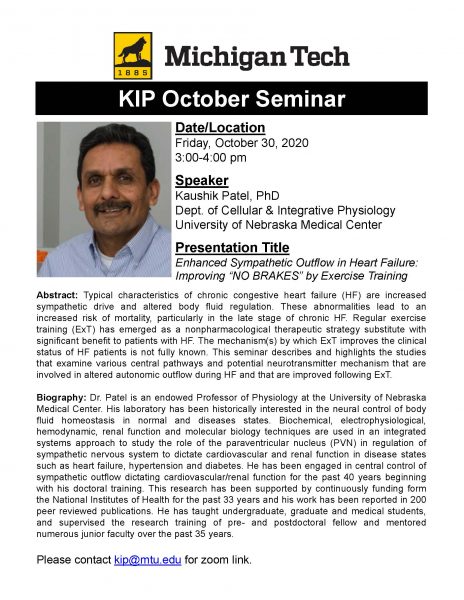
Please join us every Thursday from 7:00-8:00pm EST.
See more on the U.P. Town Hall Series here:
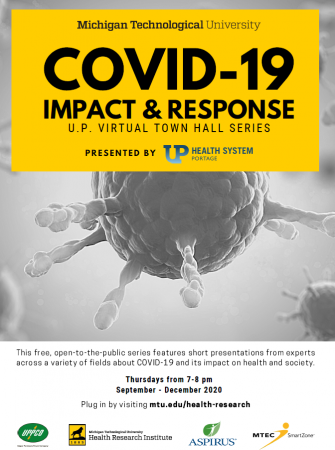
An in-depth look at the many facets of the COVID-19 will be presented every Thursday evening on the U.P. COVID-19 Town Hall Series. Organized by the Health Research Institute at Michigan Technological University, the 60-minute town hall broadcasts can be heard at 7 p.m. each Thursday through Dec. 3 on 97.7 The Wolf (WOLV-FM) and viewed through a Zoom Webinar. Over the course of the series, moderated by Drs. Steven Elmer and Kelly Kamm, clinicians, public health officials, researchers, and community experts will discuss a range of pandemic-related issues.